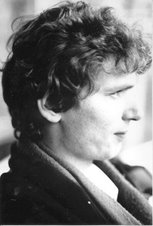__________________

"Stories from the Sandgate" by Jaklin Celik is a collection of short stories I found in a bookstore about ten days ago. Celik is an Armenian-Turkish writer who grew up in the Kumkapi neighborhood in Istanbul. Kumkapi means Sandgate - all the stories are set in this neighborhood. According to the preface, the district of Kumkapi is a working class neighborhood originally in habited mainly by Greeks and Armenians. Recently, though, the district is being populated by newly arrived migrants from Turkey's eastern and southeastern provinces. The author herself arrived in Kumkapi at the age of six, moving there with her family from Diyarbakir. Many of the Armenians and Greeks who used to live in Kumkapi, have since moved on to Greece, the US and Europe.
Except for one or two, all thirteen stories have a fleeting feeling about them: It is as if you step into people's lives for a brief moment and then you step out again. The timespan the stories cover is usually very short. Most of the stories are not even ten pages long (the entire book has only 118 pages). The stories all have a feeling of timelessness about them. There is hardly anything in them that gives a clue about the time-period the story is set in, but I have a feeling that the stories are set in the last twenty or thirty years.
House Hunting recounts the meeting of an Assyrian woman and her daughter with two old Armenian ladies, Kayane and Azat, who are looking for tenants to share their house. The timespan of this story is only the duration of the short meeting between the four, maybe half an hour. This story was one of my favorites, probably because of the glimpse into the future it gives.
Like most of the other stories, Women's Ward left me with more questions than answers: Who is the woman handing out cigarettes to the female patients at the mental hospital? Why is she doing this?
One of three stories that make up the Station Trilogy, The Diyarbakir-Istanbul Line gives a glimpse into one train compartment in the train from Diyarbakir in the east of Turkey to Istanbul on the other side of the country. The compartment is inhabited by three women who have eight children among them. Two of them are Kurdish and are joining their husbands who are working in Istanbul. The third woman, an Armenian, is originally also from Diyarbakir, but has been living in Istanbul for some time. This was one of my favorite stories as well.
The New Bride was another favorite of mine. With 25 pages it is by far the longest story in the collection. The main character is seventy-seven years old Kirkor who wants to remarry with a young woman after his first wife died a long time ago. His son is obviously very upset about this. Eventually Kirkor finds a bride from the province. But is she really such a good choice?
Though I am not absolutely wild about the book, I liked the stories, the way they give you a glimpse into the lives of people. Hardly any background, if any at all, is given about the characters, but somehow you learn something about them in the few pages of the story and most of the characters become more rounded. Still, you are always left with questions about them, about their pasts or their actions, who they are, why they do what they do.
One thing that irritated me was the amount of typo's or spelling mistakes. They weren't all over the place, but frequent enough to notice. This shouldn't have been too hard to avoid, especially since the publisher of the English translation is an American publisher specializing in Turkish books (I had a look at their website and found some interesting books there).
I had never heard of Jaklin Celik before, but I am interested enough to find out more about her and especially if she has published anything else.
NB: For the Turkish speakers who read this: I am aware of spelling mistakes in some of the locations and in the last name of the author. I tried, but was unable to insert the proper letters, that's why. My apologies!




8 comments:
A very well writen review. Only, people in Turkey don't have access to wordpress sites. We still get that nice white screen with in red why wordpress is blocked.
Dag Myrthe, leuk een andere Nederlander schrijvend op dit blog.
Interesting combination a Dutch in Istanbul and a Dutch in Yerevan.
Bringing peace to these countries.
Lof of news about Turkey in the Netherlands, almost none about Armenia, how come..)))
Groet!!
Myrthe, I heard about the book through my fiancee.
Can not find it on Amazon. Any tips?
Cheers
Interesting book review. Read your other articles as well, on your new blog. Good.
Sad for the Turks that they are censored :p They for sure need some insight from a strict neutral view, since there our Turkish friends are not good in.
They need Ouzo instead of Raki...))
I mean: 'since our Turkish friends are not good in that'...))
Thanks for the compliments, Hans and Dimitris.
Geert Jan, there are Dutch people everywhere, even in such a tiny country as Armenia! ;-) I guess Armenia is just not interesting or relevant enough for Dutch media. The only thing you hear has to do with the genocide. But Armenia is warming up already for presidential elections in February next year. They promise to be a lot more interesting than the previous ones.
Tufan, I don't know where you live, but apparently you can order the English translation through the US-publisher, Nettleberry (follow the link in my text at "their website"). For the publisher of the Turkish version, from Nettleberry's site, follow the link called "citlembik".
I found this book in my favorite bookstore in Yerevan. They had both the Turkish and the English version. I'd even gladly send you the Turkish version if you want. In that case, just drop me an email.
myrthe,
so we can expet more book reviews here. btw, its a great idea to make a blog about it...
regards
Interesting book review.
Post a Comment